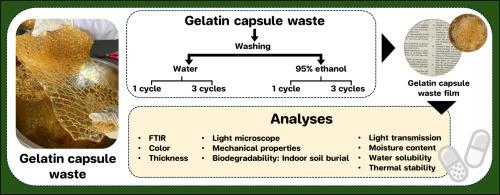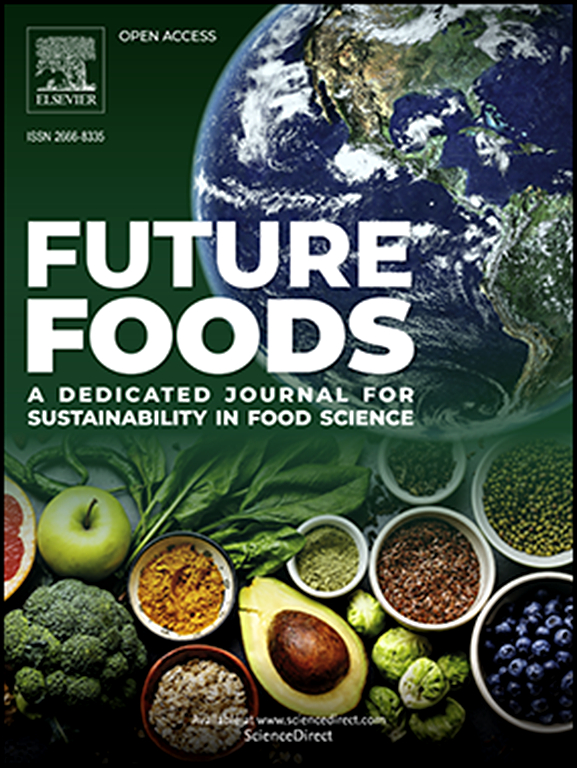明胶胶囊废料制成的新型生物降解薄膜的性能受各种溶剂和洗涤循环的影响
IF 7.2
Q1 FOOD SCIENCE & TECHNOLOGY
引用次数: 0
摘要
生物降解薄膜具有生态友好的特性,为解决环境污染和生态挑战提供了一种前景广阔的解决方案,是合成聚合物包装薄膜的可行替代品。本研究调查了使用不同溶剂(乙醇和水)和清洗周期(1 次和 3 次)对明胶胶囊废膜(GCWF)性能的影响。水洗过程可以消除原材料中的油滴,从而改善拉伸强度、热性能、透明度和溶解性等性能。用乙醇洗涤的 GCWF(GCWF Alc)与用水洗涤的 GCWF(GCWF W)相比,具有更高的拉伸强度(TS)、热性能和透明度值。增加洗涤次数还能提高清除原料中油滴的效率。土壤中的 GCWF 在掩埋后第 15 天完全降解。傅立叶变换红外光谱显示了对照薄膜(GCWF)和水洗薄膜(GCWF Alc 和 GCWF W)在色带和模式上的差异。这些发现凸显了洗涤过程在提高薄膜性能方面的潜力,利用明胶胶囊废料作为可生物降解薄膜可进一步开发食品包装应用,为环保技术做出贡献。本文章由计算机程序翻译,如有差异,请以英文原文为准。

Properties of novel biodegradable film from gelatin capsule waste as influenced by various solvents and washing cycles
Biodegradable films, featuring eco-friendly attributes, offer a promising solution to environmental pollution and ecological challenges, serving as a viable alternative to synthetic polymer packaging films. This study investigates the washing process with various solvents (ethanol and water) and washing cycles (1 and 3 times) on the properties of gelatin capsule waste films (GCWF). The washing process could improve properties such as tensile strength, thermal properties, transparency value, and solubility by eliminating oil droplets from the raw materials. The GCWF washed by ethanol (GCWF Alc) exhibited higher tensile strength (TS), thermal properties, and transparency value compared with GCWF washed by water (GCWF W). Increasing the number of washing cycles could also enhance the efficiency of eliminating oil droplets from the raw materials. The complete degradation of GCWF in soil was observed on day 15 after burial. FTIR spectroscopy revealed differences in bands and patterns between control film (GCWF) and washed films (GCWF Alc and GCWF W). These findings highlight the potential of the washing process in enhancing film properties, and the utilization of gelatin capsule waste as biodegradable films could be further developed for food packaging applications, contributing to environmentally friendly technologies
求助全文
通过发布文献求助,成功后即可免费获取论文全文。
去求助
来源期刊

Future Foods
Agricultural and Biological Sciences-Food Science
CiteScore
8.60
自引率
0.00%
发文量
97
审稿时长
15 weeks
期刊介绍:
Future Foods is a specialized journal that is dedicated to tackling the challenges posed by climate change and the need for sustainability in the realm of food production. The journal recognizes the imperative to transform current food manufacturing and consumption practices to meet the dietary needs of a burgeoning global population while simultaneously curbing environmental degradation.
The mission of Future Foods is to disseminate research that aligns with the goal of fostering the development of innovative technologies and alternative food sources to establish more sustainable food systems. The journal is committed to publishing high-quality, peer-reviewed articles that contribute to the advancement of sustainable food practices.
Abstracting and indexing:
Scopus
Directory of Open Access Journals (DOAJ)
Emerging Sources Citation Index (ESCI)
SCImago Journal Rank (SJR)
SNIP
 求助内容:
求助内容: 应助结果提醒方式:
应助结果提醒方式:


